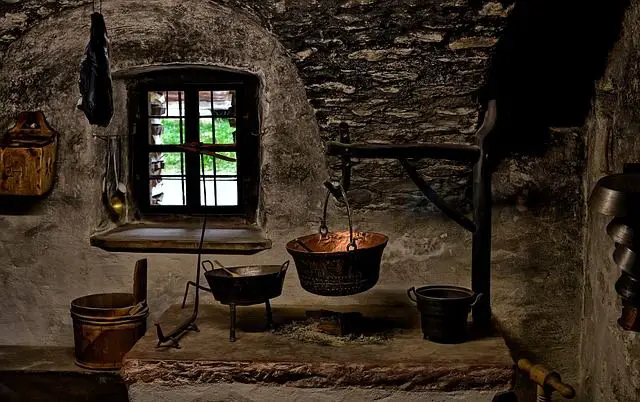Best Places To Visit In Akwa Ibom, Nigeria

Nestled in the southern part of Nigeria, Akwa Ibom is a state that boasts stunning natural landscapes, a rich cultural heritage, and a vibrant atmosphere.
From breathtaking beaches to enchanting waterfalls and captivating wildlife, Akwa Ibom offers good attractions for travelers seeking an unforgettable experience.
If you're planning a trip to Nigeria, don't forget to add Akwa Ibom state to your list of places to visit in Nigeria.
Here are some of the best places to visit in Akwa Ibom.
1. Ibom National Park

Ibom National Park is a remarkable natural treasure in Akwa Ibom, Nigeria. Spanning over 300 square kilometers, the park is a sanctuary of biodiversity, offering visitors a chance to immerse themselves in the beauty of nature and experience the wonders of the Nigerian wilderness.
Established in 1992, Ibom National Park is home to a diverse range of flora and fauna. The park's lush rainforest has many towering trees, vibrant plants, and different wildlife species.
As you explore the park's trails and pathways, you'll encounter majestic elephants, playful monkeys, antelopes gracefully leaping through the grasslands, and an array of bird species filling the air with melodious songs.
One of the highlights of Ibom National Park is the captivating Kwa Ibo River, which flows through the park, providing a serene and picturesque backdrop for visitors.
The river offers boating, fishing, and birdwatching, allowing you to appreciate the park's natural beauty from a different perspective.
Adventure seekers can explore Ibom National Park which offers thrilling activities such as hiking and trekking.

The park has well-maintained trails that take you through dense forests, rolling hills, and breathtaking viewpoints.
As you navigate these paths, you'll have the chance to witness the mesmerizing sights and sounds of the park, including hidden waterfalls, cascading streams, and a rich tapestry of flora and fauna.
Ibom National Park also provides facilities for picnicking and camping, allowing visitors to extend their stay and fully immerse themselves in the tranquility of the surroundings.
Spending a night under the stars in the park is an unforgettable experience, with the sounds of nature lulling you to sleep and the crisp morning air awakening your senses.
To ensure the preservation of its natural treasures, Ibom National Park has implemented conservation initiatives and programs.
These efforts aim to protect the park's delicate ecosystem, promote sustainable tourism practices, and raise awareness about the importance of biodiversity conservation.

Visiting Ibom National Park is not only a chance to connect with nature but also an opportunity to support the local communities.
The park provides employment opportunities for residents and promotes community-based tourism initiatives, allowing visitors to engage with the local culture and contribute to the local economy.
When planning a visit to Ibom National Park, it is advisable to come prepared with essentials such as comfortable walking shoes, insect repellent, and binoculars for birdwatching.
It's good to engage the services of a local guide who can provide valuable insights into the park's flora, fauna, and cultural significance.
Ibom National Park is a gem in Akwa Ibom, Nigeria, offering a captivating blend of natural beauty, wildlife encounters, and outdoor adventure.
Whether you're a nature enthusiast, a wildlife lover, or simply seeking an escape from the bustling city life, this park is a must-visit destination that will leave you with lifelong memories of its enchanting landscapes and remarkable biodiversity.
2. Ibeno Beach

Ibeno Beach, located along the Atlantic coastline of Akwa Ibom, Nigeria, is a stunning paradise that attracts visitors with its pristine beauty and serene atmosphere.
Known as one of Nigeria's finest beaches, Ibeno Beach stretches for miles, offering breathtaking views, golden sands, and crystal-clear waters.
As you step foot on Ibeno Beach, you'll see a picturesque landscape of endless shorelines and the gentle lapping of the waves.
The beach's soft, powdery sand invites you to kick off your shoes and take leisurely walks along the coast, feeling the warm sun on your skin and the cool breeze from the sea.
Ibeno Beach is an ideal spot for relaxation and rejuvenation. You can find a cozy place under the shade of swaying palm trees, set up a beach chair, and unwind while listening to the soothing sounds of the ocean.
The calm and tranquil atmosphere of the beach creates the perfect ambiance for escaping the hustle and bustle of everyday life.

Ibeno Beach offers an array of options. You can take a refreshing dip in the clear waters, which provide a welcome respite from the tropical heat.
Swimming, snorkeling, and even scuba diving are popular for exploring the underwater world and discovering its vibrant marine life.
The beach also presents opportunities for various water sports like jet skiing, canoeing, and banana boat rides, adding an element of excitement to your beach visit.
Whether you're a thrill-seeker or someone looking to try something new, Ibeno Beach has something for everyone.
One of the highlights of Ibeno Beach is the mesmerizing sunsets that paint the sky with vibrant orange hues, pink, and purple.
As the sun dips below the horizon, the beach becomes a canvas for nature's artwork, creating a magical setting perfect for romantic strolls or simply taking in breathtaking views.

Ibeno Beach is not just about its natural beauty; it also offers opportunities to immerse yourself in the local culture. There are many fishing communities around the beach.
You can witness the traditional fishing practices and interact with the friendly locals. Exploring the nearby villages and engaging in cultural exchanges can provide a deeper understanding of the region's heritage and way of life.
To make the most of your visit to Ibeno Beach, you should bring essentials such as sunscreen, a hat, and a beach towel. Snacks and refreshments are also good ideas due to the fewer food options on the beach.
Ibeno Beach is a true gem in Akwa Ibom, offering a serene escape and a chance to reconnect with nature's beauty.
Whether you're seeking relaxation, adventure, or a cultural experience, this pristine beach will captivate your senses and leave you with memories to cherish.
3. Akwa Ibom State Museum

The Akwa Ibom State Museum is a fascinating cultural institution that showcases the rich heritage and diverse traditions of the people of Akwa Ibom, Nigeria.
Located in Uyo, the capital city of Akwa Ibom State, the museum provides a glimpse into history, art, and culture, offering visitors a unique opportunity to delve into the past and gain a deeper understanding of the local communities.
The museum houses a remarkable collection of artifacts, artworks, traditional crafts, and historical relics that tell the story of Akwa Ibom's cultural evolution.
Exhibits range from traditional masks, sculptures, and pottery to ancient tools, musical instruments, and ceremonial objects. Each item on display reflects the ingenuity, craftsmanship, and symbolism embedded within the cultural fabric of Akwa Ibom.
As you explore the museum, you'll embark on a journey through time, witnessing the transformation of the region from pre-colonial times to the present day.
Exhibitions highlight the diverse ethnic groups in Akwa Ibom, including the Ibibio, Annang, Oron, and Efik, shedding light on their customs, rituals, and traditional practices.

One of the sections of the Akwa Ibom State Museum is dedicated to the colonial era, showcasing the impact of European contact on the region.
Here, you can find artifacts from the colonial period, such as colonial-era photographs, clothing, and documents, which provide insights into the historical interactions between Akwa Ibom and the European powers.
Visiting the museum offers an immersive experience, with informative displays, descriptive panels, and knowledgeable staff members who can provide further insights into the exhibits.
The museum's curators and guides are passionate about sharing the cultural heritage of Akwa Ibom, available to answer questions and engage in discussions about the artifacts and their significance.
In addition to its permanent exhibits, the Akwa Ibom State Museum also hosts temporary exhibitions and cultural events throughout the year.
These events may include art displays, traditional performances, storytelling sessions, and workshops, providing visitors with a deeper appreciation of the region's living traditions and contemporary artistic expressions.

A visit to the Akwa Ibom State Museum is an opportunity to learn about the local culture and to support the preservation and promotion of the region's heritage.
By visiting the museum, you contribute to the ongoing efforts to conserve and showcase the cultural treasures of Akwa Ibom, ensuring that future generations can continue to appreciate and understand their cultural roots.
Before planning your visit, it is advisable to check the museum's operating hours and any special exhibitions or events that may be taking place.
Remember to bring a camera to capture memorable moments and respect any photography guidelines within the museum.
The Akwa Ibom State Museum is a must-visit destination for anyone interested in the history, art, and cultural diversity of Akwa Ibom.
It offers a captivating journey through time, allowing visitors to connect with the past, gain insights into the present, and appreciate the cultural richness that defines the region.
4. Ikot Abasi Historical Town

Ikot Abasi Historical Town, also known as Opobo Town, is a captivating destination in Akwa Ibom State, Nigeria.
Steeped in history and boasting well-preserved colonial-era architecture, Ikot Abasi offers visitors a glimpse into Nigeria's past and significant role in the country's oil industry.
The town's history is closely intertwined with the story of King Jaja of Opobo, a prominent 19th-century trader and statesman.
King Jaja established the Opobo Kingdom, which later became a major center for trade and commerce in the region.
His influence and wealth attracted the attention of European powers, leading to conflicts and exile. Despite this tumultuous history, the legacy of King Jaja and the Opobo Kingdom is still celebrated in Ikot Abasi today.
One of the main attractions in Ikot Abasi is the Opobo King's Palace, a remarkable architectural masterpiece.
The palace is a symbol of the town's rich heritage and serves as a testament to the once-thriving Opobo Kingdom.

The palace's intricate designs, traditional motifs, and historic artifacts offer visitors a glimpse into the opulence and grandeur of the past.
Exploring the palace allows you to appreciate the craftsmanship and cultural significance embedded within its walls.
Another notable architectural gem in Ikot Abasi is the Scottish Presbyterian Church, the St. Paul's Cathedral.
Built-in the late 19th century by Scottish missionaries, the church showcases European and local architectural styles.
Its imposing structure, stained glass windows, and serene interior create a peaceful and reflective atmosphere. Attending a church service or simply admiring the church's unique design is a must-do for visitors.
Walking through the streets of Ikot Abasi is like stepping back in time. The town has a well-preserved colonial-era building, many are now museums, restaurants, or guesthouses.
These structures exude an old-world charm and serve as a reminder of Ikot Abasi's historical significance as a trading hub and administrative center.
To fully immerse yourself in the town's history and culture, engaging with the local community is highly recommended.

The friendly residents of Ikot Abasi are known for their hospitality and are eager to share stories and anecdotes about the town's past.
Interacting with locals, visiting local markets, and participating in cultural festivals provide a deeper understanding of the town's traditions and way of life.
In addition to its historical charm, Ikot Abasi offers natural beauty. The town is situated along the banks of the Imo River, providing picturesque views and opportunities for boat rides and fishing.
Exploring the river and its surrounding mangrove forests adds an element of adventure to your visit.
To fully enjoy your time in Ikot Abasi, it is advisable to hire a local guide who can provide insights into the town's history, take you on a guided tour of the key landmarks, and help facilitate interactions with the local community.
Ikot Abasi Historical Town is a hidden gem in Akwa Ibom, Nigeria, offering a unique blend of history, architecture, and cultural experiences.
Whether you're a history enthusiast, an architecture lover, or simply curious about Nigeria's past, a visit to Ikot Abasi promises a memorable journey through time and a deeper appreciation of the region's rich heritage.
5. Uyo Township Stadium

The Uyo Township Stadium, also known as the Godswill Akpabio International Stadium, is a state-of-the-art sports complex in Uyo, the capital of Akwa Ibom State, Nigeria.
As one of the most modern and impressive stadiums in Nigeria, it's a significant venue for sporting events, concerts, and cultural activities.
The stadium was constructed to meet international standards and has a seating capacity of over 30,000 spectators.
It was named after Chief Godswill Akpabio, the former governor of Akwa Ibom State, in recognition of his contributions to the development of the state.
The Uyo Township Stadium has become a hub for football matches, hosting domestic and international games.
It is the home stadium of the Akwa United Football Club, one of the Nigerian football teams.
The stadium's well-maintained pitch, top-notch facilities, and modern amenities create an ideal setting for players and spectators.
One of the notable features of the Uyo Township Stadium is its architectural design.
The stadium's roof design resembles a traditional African woven basket, reflecting the region's cultural heritage and adding a unique aesthetic touch.
The shape provides shade for the spectators and natural ventilation, ensuring a comfortable viewing experience even in the Nigerian climate.
In addition to football matches, the Uyo Township Stadium has hosted various national and international sporting events.
It has been a venue for track and field events, including the Nigerian Athletics Championships, and has attracted renowned athletes from around the country and beyond.
The stadium's state-of-the-art facilities, including the athletic track, training areas, and warm-up facilities, make it an excellent choice for hosting athletic competitions.
Beyond sports, the Uyo Township Stadium has been a venue for major concerts, cultural festivals, and religious gatherings.
The spaciousness of the stadium and its modern infrastructure make it an ideal location for hosting large-scale events that attract thousands of attendees.
Visitors to the Uyo Township Stadium can expect a well-organized and secure environment.

The stadium has ample parking space, well-trained security personnel, and comfortable seats.
Additionally, food and beverage outlets are available within the stadium complex, ensuring that spectators can enjoy refreshments during events.
Whether you're a sports enthusiast, a music lover, or interested in cultural events, the Uyo Township Stadium offers an exciting and vibrant venue for different activities.
Its impressive infrastructure, combined with the warm hospitality of the people of Akwa Ibom, guarantees a memorable experience for both participants and spectators.
When planning a visit to the Uyo Township Stadium, it is advisable to check the schedule of events and purchase tickets in advance if required.
This ensures that you can secure a spot and enjoy the experience of the stadium's vibrant atmosphere.
The Uyo Township Stadium is a testament to Akwa Ibom's commitment to sports, entertainment, and community engagement.
It's a gathering place where people come together to celebrate the spirit of competition, showcase talent, and create lasting memories.
6. Oron Museum

The Oron Museum, located in Oron, Akwa Ibom State, Nigeria, is a cultural institution dedicated to preserving and promoting the heritage of the Oron people. It's a window into the rich history, traditions, and artistic expression community.
The museum showcases a diverse collection of artifacts, artworks, and historical objects that depict the cultural and historical evolution of the Oron people.
Exhibits within the museum provide insights into the traditional lifestyle, beliefs, and customs of the Oron community, allowing visitors to gain a deeper understanding of their unique identity.
One of the focal points of the Oron Museum is the display of traditional Oron art. The Oron people are known for their exceptional artistic skills, particularly in wooden sculptures, masks, and pottery.
The museum showcases different artworks, highlighting the intricate designs, symbolism, and craftsmanship embedded within them.
These artistic expressions prove the creativity and cultural heritage of the Oron people.

Additionally, the Oron Museum offers a glimpse into the historical significance of the region.
Exhibits feature archaeological artifacts, historical documents, and photographs that chronicle the past of Oron and its surrounding areas.
Through these displays, visitors can learn about the interactions with neighboring communities, the impact of trade and colonialism, and the struggles and triumphs of the Oron people throughout history.
The museum also serves as a platform for cultural education and community engagement.
It hosts workshops, seminars, and events that promote Oron traditions, arts, and cultural practices.
These activities provide opportunities for locals and visitors to actively participate in the preservation and promotion of Oron heritage.

Visiting the Oron Museum offers an immersive experience of the cultural tapestry of the Oron people.
The museum provides informative displays, descriptive panels, and knowledgeable guides who can offer further insights into the exhibits and answer questions.
To make the most of your visit, it is advisable to plan and check the museum's opening hours.
You may also want to engage the services of a local guide who can provide in-depth information about the exhibits and the Oron community.
The Oron Museum is a treasure trove of cultural heritage, serving as a bridge between the past and the present.
It allows visitors to appreciate the artistic achievements, historical significance, and unique traditions of the Oron community.
By exploring this museum, you can gain a deeper appreciation for the cultural diversity and rich heritage of Akwa Ibom State.
Conclusion
Akwa Ibom, Nigeria, is a region of rich cultural heritage, natural beauty, and historical significance.
With its diverse attractions and warm hospitality, it offers a captivating blend of history, culture, and natural wonders that will leave a lasting impression on visitors.
From the breathtaking landscapes to the vibrant cultural institutions, Akwa Ibom has something for every traveler to explore and appreciate.
So pack your bags, embark on an adventure, and let Akwa Ibom create unforgettable memories.
